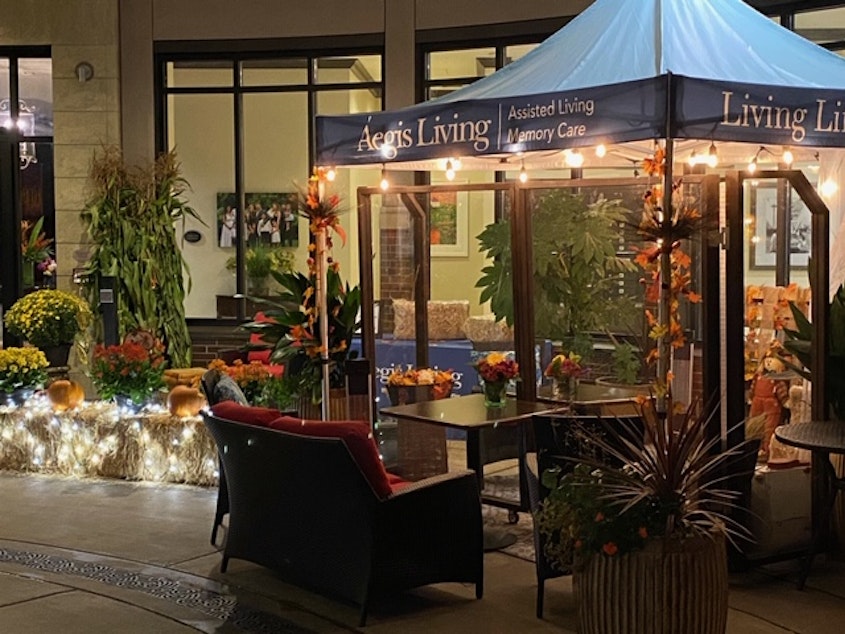'We find our way.' How older adults are coping with pandemic isolation

The pandemic has been hard on everyone, but even harder for older adults. Not only are they vulnerable to the deadly coronavirus; current restrictions also put them at an increased risk of social isolation.
Wolfgang Mack remembers the early days of the lockdown.
“Everything was done for us to make us almost forget we were in lockdown,” said Mack, 91. “It felt like a never-ending cruise, you know.”
Mack and his wife Francesca, 85, had just moved to Aegis Living on Mercer Island. They manage to keep in touch with friends and family by phone and, like many of us, through Zoom.
“Well, at first it wasn’t so easy,” recalled Francesca. “But now we are coached through it and we find our way.”
The Macks have gotten the hang of it. Francesca said they’re able to keep some of their traditions like making German Christmas bread with her son.
Sponsored
“We were on Zoom and he is baking, and I am telling him what to put in next and how to stir it … it’s been a big part of our lives.”
Staying socially engaged is important for residents' health. Chris Corrigall, vice president of life enrichment at Aegis Living, said they had to think creatively about different activities. They also created spaces so residents could visit with family.
“We created outdoor living rooms,” said Corrigall. “There’s wonderful soft seating outside, safe distanced furniture, with plexiglass in the middle. And those have been exceptionally popular.”
Covid-19 aside, social isolation is an ongoing issue for older adults, especially those who live alone. But in the context of the pandemic, the issue of loneliness is cause for even more alarm, said Clara Berridge, assistant professor at the University of Washington’s School of Social Work. She co-authored a recent study into how older adults are coping during the pandemic.
“A lot of providers felt isolation may even be as deadly — or more dangerous — than the pandemic itself. It’s been referred to as the 'double pandemic.'”
Sponsored
Isolation can lead to mental and physical health consequences, Berridge added.
“Some of those are depression, increased suicide ideation. People we interviewed who served older adults with dementia overwhelmingly reported that they are more withdrawn, less motor active, less engaged because they’re kept in the rooms a lot.”
Berridge said that while digital tools help connect people, not everyone has access to technology.
“That number is higher in Latino older adults. And we know in the state of Washington, the digital divide is even more apparent in rural and underserved communities, especially where Black and Indigenous people and people of color live.”
So what options are available to those without internet access? At Southeast Seattle Senior Center, Executive Director Lynda Greene said the majority of their members don’t own a computer. So the center reached out to them the old-fashioned way.
Sponsored
“We set up a phone tree so that we had volunteers who actually reached out to all of our seniors.”
Greene said they would ask how they were doing, what they need, and if they have enough food.
“Most of the responses we got back were, 'We’re lonely. We miss seeing people.'”
In response, the senior center expanded their lunch program. Before the pandemic, the center averaged about 30 people per day; now it’s six times that. A team of volunteers delivers hot meals to people in their homes. Greene said some have become friends.
Looking ahead, Greene said they’ll continue to do things differently.
Sponsored
“The way we used to do things is long gone … but the beauty of this is, this is an opportunity to think outside of the box.”
As much as organizations have been able to quickly adapt, Clara Berridge from the University of Washington said the pandemic has exposed some deep cracks when it comes to support for systems serving older adults.
“In case folks think this is somebody else’s issue, I want you to take the long view. Because the ways in which we respond to the needs of older adults during this crisis, I think, really shape our expectations for how we’ll be treated in our old age. And you know, don’t we all want to look forward to our futures?”




